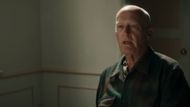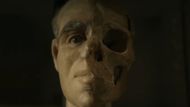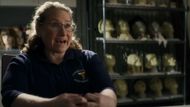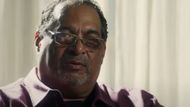The Mortician is a documentary series directed and produced by Joshua Rofé. The show premiered on June 1, 2025, and has become one of the most-watched documentary series by HBO in the past few years. The Mortician is about the family-run funeral home services called the Lamb Funeral Home, which were taken over by David Sconce in the 1980s. Soon, it was revealed that Sconce had betrayed the people’s trust by mutilating corpses for financial gain and even hiring hitmen for rivals. The show features interviews with the victims and the past employees and is a gritty watch. Here are 7 reasons why David Sconce ultimately suffered from a downfall in The Mortician.
Disrespect for the dead, Media and public outrage, and other reasons why David Sconce suffered from downfall in The Mortician
1. Blind greed for profit and expansion

One of the primary reasons for the downfall of David Sconce from The Mortician is his express greed for unbridled expansion and profit. Running a funeral home is not a work where profit should be catered to, and yet, this is exactly what Sconce did in The Mortician. David Sconce’s desire to rapidly expand Lamb Funeral Home services led to his ethical and legal downfall. He wanted to dominate the cremation market in California, and he therefore created Coastal Cremations as a cost-cutting venture. However, he bypassed regulations and standards in creating this venture. The expansionist greed pushed him to prioritize efficiency over dignity, and he began treating human remains as disposable inventory. Former employees in the documentary mention that Sconce would burn 15 bodies at a time in industrial kilns and steal jewelry from the remains. Therefore, the man tried to monopolize grief. The more bodies he processed, the more money he made, and that singular focus turned him from a funeral director into a money-hungry businessman. His ambition overruled the solemnity of his work. Eventually, the shortcuts he took—offering unusually low prices and cremating multiple bodies at once—couldn’t be hidden. Sconce therefore finally came under the scanner, as shown in The Mortician.
2. Disrespect for the dead

Perhaps one of the most chilling aspects of The Mortician is that David Sconce did not respect the dead and treated them like objects to be disposed of and made money out of. He played with the emotions of the families who put trust into him for the last rites of their beloved people, and he exploited that trust. Sconce’s practices showed utter contempt for the people he was paid to honor. In an industry built on reverence for the dead, he treated bodies like garbage. Since Sconce took over the family business in the 1980s, he began to create channels for profit. As explained above, former employees have spoken about how the remains were incinerated en masse and in a single retort that was built for one. Some of the employees have spoken on how Sconce used to break bones in bodies to ensure cremations could be completed as soon as possible. Due to Sconce’s methods, ashes were mixed, urns were mislabeled, and grieving families were handed remains that weren’t their loved ones. Funeral directors hold sacred trust, but Sconce shattered it. His disregard wasn’t an accident or incompetence; it was systematic, efficient, and cold-blooded. Finally, word about his atrocities eventually leaked in 1987 when a former World War II soldier who lived near Coastal Cremations called the authorities after experiencing the smell of burning flesh from the funeral home. Sconce was finally arrested for playing with the emotions of the people, as detailed in The Mortician.
3. Criminal conspiracies and murder allegations

Once Sconce’s crimes were discovered by the law in The Mortician, the true extent of his desecrations finally came to light, and it highlighted how depraved he was. Sconce’s fall was final when it was revealed that the funeral home director had turned into a mob boss. Reports emerged that he had solicited or arranged for the beating or murder of rival morticians to secure business dominance. Sconce was so paranoid about being the biggest shark in the business that he resorted to unethical means, and he took criminal measures. He began believing that his competitors had to be eliminated if they wouldn’t sell or back off. The threats were not idle, as investigators linked him to a violent network that enforced his wishes. One such assault severely injured a rival. Though Sconce was not convicted of murder, the mere association tainted his name irreparably. As the investigations went deeper and deeper in The Mortician, it had become clear that David Sconce had no morality, and he used financial corruption, physical violation, and intimidation to run his business. A line of work that should have been somber had turned into the site for gruesome greed, tarnishing, and criminal activities. The moment Sconce crossed into violence, his downfall became inevitable.
4. Employee exploitation and toxic leadership

The Mortician reveals that David Sconce ran his criminal empire on a culture of fear, control, and compliance. He manipulated his staff, and all the employees at Coastal Cremations were expected to follow horrifying procedures. Everything that Sconce did—mass cremations, falsified death certificates, and mixing of remains—his employees had to do it as well or remain silent spectators. Even though Sconce’s wife does not say much in the documentary, she reveals that Sconce once sold the gold from a dead person’s tooth. Therefore, even his wife was silenced by him. Those who questioned him were silenced, fired, or intimidated. Due to his toxic leadership, the subordinates were surrounded by an environment of fear, as they were often young, inexperienced, and unsure how to challenge the chain of command. Worse, Sconce justified his actions with twisted logic and told everyone that this was business and not religion. Finally, the whistleblowers began teeming in, and complaints surfaced from former workers who came forward. A clear picture of systemic abuse emerged, and it was revealed in The Mortician that Sconce didn’t merely bend rules; he taught others to do the same, turning the workplace into a crime scene. This top-down corruption led to multiple testimonies against him when the legal system caught up.
5. A long trail of fraud

One of the main reasons why David Sconce had to face his downfall is because he left a paper trail of fraud in The Mortician. His downfall happened in the 1980s when everything was not online as it is today. Therefore, there were proofs of how he illegally handled his business. Fraud was therefore central to Sconce’s downfall. Sconce altered death certificates, forged cremation permits, and falsified remains logs to cover up the chaos. Further, to boost profits, he reused urns, issued fake ashes, and minimized fuel use by overloading crematoriums. All of this was bound to leave a trail—digital, paper, and testimonial. One of the things that the authorities noticed was the inconsistencies between the number of death certificates filed and the number of bodies reportedly cremated. Worse, the families had to go through a harrowing time as they demanded explanations when remains arrived suspiciously light or when urns contained nails, buttons, and other debris. These discrepancies triggered audits, investigations, and lawsuits. Funeral homes are bound by strict legal and environmental regulations, and they can’t afford to be creative with their bookkeeping. Once investigators caught a whiff of the lies in The Mortician, the forensic paper chase began. His business operations, once shrouded in deathly silence, became exhibits in court. Sconce’s own mistakes and love for frauds turned his empire into a ticking bomb. Once the documentation surfaced, prosecutors had everything they needed to bring him down.
6. Media and public outrage

The Mortician brings to light how cleverly David Sconce was involved in playing with the trusts of hundreds of grieving families. This documentary was possible because the case had gotten the rightful media attention that it deserved. The media played a crucial role in exposing the grotesque details of Sconce’s practices. When people got to know about the mass cremations, mixed remains, and threats against competitors, the public outrage was at an all-time high. The media called him a “Death Dealer” or “The Cremation Kingpin,” and his name became synonymous with disgrace in the funeral industry. But the worst fact was that the families who had trusted him with their loved ones went to the press and tearfully recounted their betrayal. It was these families who had to pay the brunt of Sconce’s illegal work. In a profession where death rituals are deeply personal and culturally sacred, Sconce touched a nerve by exploiting it. Public pressure mounted on authorities to act decisively, and there were calls for regulatory reforms. In the court of public opinion, Sconce was already condemned due to public protests and outrage. This intense scrutiny ensured that prosecutors wouldn’t cut corners and juries wouldn’t look away. Once the media spotlight turned on him in The Mortician, it was sure that Sconce would finally be caught for his crimes.
7. Sullying the family name

One of the worst aspects of this case in The Mortician was that David Sconce wasn’t just destroying his own life; he was also destroying his family’s name. The Lamb Funeral Home had been respected for generations, and there was an air of legacy behind the name. It stood for care, dignity, and trust in Pasadena. However, David inherited a position of privilege and turned it upside down with his greed for power and money. Instead of honoring his family’s reputation, he turned their good name into a criminal enterprise. Everyone who was near and dear to David Sconce was blindsided by his deeds. As the investigations grew, the family business was shut down, and the Lamb name became one of infamy. The family name had been turned into ashes, and The Mortician showcases how the family members had to suffer through an emotional and reputational toll. Further, David’s downfall was both professional and personal. Now Sconce is a name that is inevitably tied with shame. Sadly, a man that should have respected his family's name, which had been in the business since 1929, had sullied the legacy forever and had brought dishonor upon such a noble profession.
